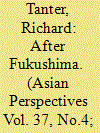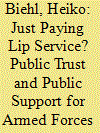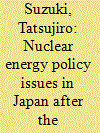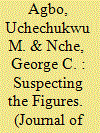|
|
|
Sort Order |
|
|
|
Items / Page
|
|
|
|
|
|
|
| Srl | Item |
| 1 |
ID:
124591


|
|
|
|
|
| Publication |
2013.
|
| Summary/Abstract |
Investigations of the Fukushima nuclear power accident sequence revealed the man-made character of the catastrophe and its roots in regulatory capture effected by a network of corruption, collusion, and nepotism. A review of corruption incidents in the global nuclear industry during 2012-2013 reveals that the Japanese experience is not isolated. Gross corruption is evident in nuclear technology exporting countries such as Russia, China, and the United States, and in a number of nuclear technology importing countries. The survey results make clear that national nuclear regulatory regimes are inadequate and that the global regime is virtually completely ineffective. Widespread corruption of the nuclear industry has profound social and political consequences resulting from the corrosion of public trust in companies, governments, and energy systems themselves.
|
|
|
|
|
|
|
|
|
|
|
|
|
|
|
|
| 2 |
ID:
189926


|
|
|
|
|
| Summary/Abstract |
The article presents an empirical analysis of whether, how, and why people are active to either support or protest against the Bundeswehr. Public opinion polls consistently report high levels of trust in the military. According to the social-psychological approach of participation theory, this trust should lead to corresponding actions. However, the literature on civil–military gaps claims that the majority of people pay mere lip service to soldiers rather than actively support the armed forces. No active support despite high levels of trust? In an effort to empirically test the level and the determinants of the public’s support for and protest against the military, an activity scale was included in a representative opinion poll in Germany. The analyses show that a fairly large part of the German population engages in activities that support the Bundeswehr and that public trust in the military predicts that supportive behavior. Importantly, trust in the armed forces remains a strong predictor of citizens’ activities related to the armed forces even when controlling for numerous other factors. Taken together, these findings contradict the widely shared view of a civil–military gap and instead provide empirical evidence for the social-psychological approach of participation theory.
|
|
|
|
|
|
|
|
|
|
|
|
|
|
|
|
| 3 |
ID:
142009


|
|
|
|
|
| Summary/Abstract |
The 2011 Fukushima nuclear accident has become a turning point for Japan, creating loss of public trust not only in nuclear safety but in overall energy policy. More than 80 percent of the public wants to phase out nuclear power eventually. On April 11, 2014, the Japanese government adopted a new National Energy Strategy that declares its intention to reduce dependence on nuclear energy while considering it one of the important base-load electricity sources. Regardless of the future of nuclear energy, Japan needs to face five key policy issues: spent fuel management, plutonium stockpile management, radioactive waste disposal, human resources management, and restoration of public trust. I discuss these critical issues and possible policy alternatives that Japan should pursue.
|
|
|
|
|
|
|
|
|
|
|
|
|
|
|
|
| 4 |
ID:
193197


|
|
|
|
|
| Summary/Abstract |
Public trust in government can significantly determine the outcome of health policies in any society. Hence, studies have been gauging peoples’ level of trust in their governments’ commitment and capacity to win the fight against COVID-19. However, these studies have omitted religious leaders. This is despite the fact that religious leaders play key roles in the area of health in many societies. The present study, therefore, explored the opinions church leaders have about the credibility of the COVID-19 statistics and other government responses in Nigeria. Data were collected through semi-structured interviews with 18 church leaders drawn from Anglican, Catholic, and Pentecostal churches in Nigeria. A descriptive narrative approach was employed in the thematic organization and analysis of data. Findings show that only one participant expressed confidence in the credibility of the COVID-19 statistics and other government’s responses. The rest, with the exception of one participant who was uncertain, was distributed between those who believe the statistics and other government efforts are exaggerated and those who believe they are false. The study also found that denominational affiliation mattered with respect to the perceptions about the credibility of the COVID-19 statistics and other government responses. Implications of findings for policy and research are discussed.
|
|
|
|
|
|
|
|
|
|
|
|
|
|
|
|
|
|
|
|
|